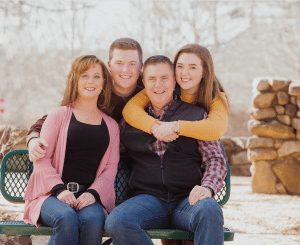A New Path of Service: Scott Dawson

Scott Dawson has already left his mark on all of Alabama’s 67 counties. As the founder of Birmingham-based Scott Dawson Evangelistic Association, he has preached, spoken in schools, organized events on football fields, and hosted students and youth leaders at conferences. He jokes that perhaps ABC 33/40 meteorologist James Spann is the only person who can claim he knows more Alabama backroads than he does. After being in full time ministry for more than 30 years, Dawson shares how he sensed God calling him to follow a new path of service: politics, specifically using his experiences and gifts in the leadership role of governor of Alabama.
Dawson spent his childhood on the west side of Birmingham in Ensley, his mother a day care worker and his father a truck driver. He says his best memories of his youth include a modest budget, traditional values and plenty of time outdoors. “It was a neighborhood. You get on your bike; you just take off. We didn’t have a lot of money, but we did have a lot of fun because you’d go outside and play all day,” he recalls, noting that his father umpired and coached baseball in the community. “It’s a different day now, but I remember back then if you messed up, it didn’t matter if your parents saw you or not. If somebody else’s parents saw you, you were still gonna get it because it was just more of a community atmosphere. You had the art of friendship back then.”
As a teenager, Dawson’s first job was at Shoe City in Five Points West. He also worked at Western Supermarkets, starting out bagging groceries on the front end of the store. After high school, he began studies at Samford University and continued with Western as an assistant manager. The value of hard work was something demonstrated for Dawson for much of his youth. He often tells the story of how his father was laid off from his trucking company when it closed after 28 years in business. “I didn’t see my dad complain once. Every day he was going to find something to do, a job. A work ethic is something that you may despise learning the lesson, but once you’ve learned it, you’ve learned something valuable in life.” Dawson says the adults in his life—parents, bosses, coaches—also taught him the difference between being busy and being effective. “You’ve got to do something to start moving yourself forward.”
In matters of faith, Dawson says he “received Christ” at a Nicky Cruz crusade in Birmingham in the early 1970s, not long after his parents’ conversion at an in-home Bible study. “I’ve seen the transformation Christ can do in anyone’s life because I saw it in my parents,” he explains. “He brings peace. He brings hope. He brings a new way of thinking, new opportunities, new goals. I tell everyone, Jesus is not what I do, He’s who I am, and I don’t think we wear religion on our sleeves. Everyone in our society is fatigued about that. [They] want to see the difference He’s made in my life, and that’s what I saw in my parents.” In high school, Dawson developed a passion for sharing the Gospel with his peers. The first time he preached before a crowd at a worship service, he was 15 years old and had prepared “day and night, night and day.” “I usually tell people I went from Genesis to Revelation twice in 12 minutes,” he remembers with a laugh. “I think it was a 30,000-foot view, but the ultimate message was you can have hope.” When people responded to his passion from the pulpit, he says, “it was kind of like when you go fishing and catch your first fish. You’re just hooked, and I never looked back.”
When Dawson enrolled at Samford, where he would eventually earn his Master of Divinity from Beeson Divinity School, he continued to regularly preach the Gospel at Youth Revivals, speaking in high schools during the day and youth group services at night. He and several area youth pastors discussed the need for Christian teenagers to experience a time away from the regular scheduled church services. Their vision–a formal retreat. Jesus took his disciples on retreats, they realized, but he always had a goal in mind. “If you read Scripture, every time Jesus took his disciples off on a retreat, when they came back they moved forward the ministry. It’s not supposed to be something on the calendar, it’s supposed to be something that’s motivation in the heart.” Dawson’s father called Minneapolis, Minn., and got in touch with The Rev. Billy Graham Evangelical Association, who helped them organize their vision and incorporate the Scott Dawson Evangelical Association (SDEA).

Since then, SDEA has grown to a comprehensive outreach organization with 15 full-time members on staff and a budget in excess of $3 million a year. SDEA winter student conferences have grown from less than a hundred in attendance in 1987 to one of the nation’s largest with over 12,000 in attendance annually. Dawson has also written books about traditional faith and evangelism and has pioneered new ministries in digital technologies that train others in spreading the Gospel worldwide. Last year, however, Dawson chose a change of pace. He would take a leave of absence as CEO of his ministry to refocus his leadership skills on Alabama politics, specifically a campaign for governor.
Not an experienced politician, Dawson readily admits he declined suggestions he run for governor twice before prayer—and a revelation about the biblical figure Nehemiah—changed his mind. “I knew Nehemiah did the impossible—he built a wall—but [there was] one thing I never understood about him even though I’ve preached Nehemiah, I’ve read Nehemiah. Nehemiah wasn’t a construction worker. He was a cup bearer to the king. His heart was broken; he was grieving for Jerusalem. You have to grieve over our state with the history of politics in Alabama. You know the stories. You know the corruption we’ve had. Two, Nehemiah knew what needed to happen. I just sense that I’ve got a clear direction for Alabama.”
At a campaign rally at Pelham Civic Complex in March, Dawson told the crowd how he sought out advice from former Arkansas Governor Mike Huckabee regarding running for governor of Alabama. “He was someone who was in my lane, a pastor who went into politics,” said Dawson. Huckabee shared with the crowd that what makes Dawson uniquely qualified for governor is that he is not in government. He also spoke of Dawson’s “real, honest humility.” “He is willing to be a servant, a vessel, through whom God can do something of value,” said Huckabee. “There are four things a person has to have to be an effective pastor or political figure.
- You have to have a message you are passionate about.
- You must be able to motivate volunteers.
- You have to understand all forms of media and how to use it. How to use a microphone, how to speak in front of a crowd of 10 to 1000. How to stand in front of a camera. How to use the internet.
- You must be able to raise money and be a good steward of it.
People think it’s a big jump from pastor to politics but it is not.”

Dawson credits much of his success to not being afraid to chase his dreams in his youth. He learned how to organize an effort, inspire people toward change, manage contracts and budgets, and communicate with passion while planning his first conference a teenager, before SDEA was even a formal organization. “I learned more in that conference with 89 kids than I learned this past year with 12,000 students,” he says. “Back then it was me, my parents, and maybe one friend working everything. I had to know how to do reservations, I had to know how to read contracts, I had to know how to mobilize students and get them from one place to the other.” The experience, Dawson suggests, will carry over into success as governor. “I’ve been around the state for 30 years. I’m used to grinding it out with doing high school assemblies, speaking at night, doing multiple different events to multiple different audiences. That has proved very valuable for this campaign because I’ll walk in and do a Kiwanis Club, then do a GOP forum, and then go speak to businessmen. And you’ve got to be able to adapt a message to every age group and every part of society.”
The most important lesson Dawson carries into his campaign is that in order to be a godly leader, he must remember he’s not in the “God business.” Yet God has blessed him with leadership and visionary skills. “[God] is in business for himself. You’re in the people business because if people don’t like you, they will not follow you where you need them to be. If we’re going to move our state forward, you’ve got to have a leader that can articulate a vision. You’ve got to have a leader that can build consensus. You’ve got to have a leader that can draw people together. Without vision, people perish. We’ve got to have a direction for Alabama to go.”
- Camille Smith Platt








